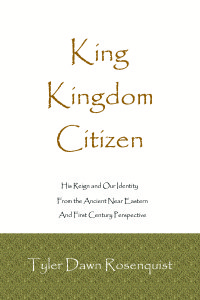 Hey there, I just wanted to remind everyone that tomorrow night at 8pm EST, Wednesday April 22, Matthew Vander Els will be teaching about The Structure of God’s Righteousness and the Law of Liberty.
Hey there, I just wanted to remind everyone that tomorrow night at 8pm EST, Wednesday April 22, Matthew Vander Els will be teaching about The Structure of God’s Righteousness and the Law of Liberty.
I won’t be there but I wanted to share a chapter from the “Kingdom” section of my newest book King, Kingdom, Citizen: His Reign and Our Identity because it ties in to what he will be teaching. Be sure to tune in at this link – Matthew is a great teacher and his excitement about Biblical context is absolutely contagious.
The Foundation of His Throne
Psalm 89:14 Justice and judgment are the habitation of thy throne: mercy and truth shall go before thy face.
I say this often, but this is one of my favorite verses in Scripture (I also make this claim about at least a thousand other verses). The concept of kingdoms being established on “righteousness and justice” is another area that archaeology has opened up for us.
Alone, the words “righteousness” and “justice” have clearly defined meanings that are not adequately reflected by either Strong’s (which only shows the English words that each Hebrew or Greek word was translated into) or Thayer’s and I am indebted to Ryan White for the excellent study he did into the ancient concepts embodied by the words tsedek, translated “righteousness,” and mishpat, rendered as “justice.”
The word mishpat means: the quality of being “free from favoritism, self-interest, bias or deception, especially conforming to the established standards or order.” We find the word mishpat translated as “justice,” and from this we also derive the words judge and judgment. In light of the true meaning of mishpat, judgment loses much of its negative aura and is instead an instrument of delivering the oppressed from the oppressor. If we are wronged, we want to be judged; we desire judgment between ourselves and the person who has harmed us. In the ancient Near East, the ability to judge righteously was one of the hoped for qualities of a good king: one who delivers fair rulings between his subjects. When YHVH delivered the children of Israel from the hand of Pharaoh’s oppression, He was showing Himself as a King of justice by doing what only a good King can do.
The word tsedek, generally translated “righteousness,” simply means: “to be in the right.” According to Moshe Weinfeld (Social Justice in Ancient Israel and in the Ancient Near East) this word is tied to the concept of salvation and restoration. If a judgment is made between two people, one is declared righteous and the other unrighteous – one is in the right and the other is in the wrong. Hence Judah’s declaration of his daughter-in-law’s innocence when he said, “She is more righteous in this matter than I am.” (Gen 38:26) Judah judged rightly between himself and Tamar, and he found her to be in the right.
When these two words are paired together, something interesting occurs – and we find parallels in the kingship documents of many cultures and languages in the ancient world. Justice and righteousness were the kingly ideals of the ancient Near East. When ascending the throne of his new kingdom, a king would enact certain measures that would set him apart in the eyes of his subjects: slaves would be freed, oppressors would be punished, widows, poor and orphans would be cared for, and debts would be wiped out. In the reigns of earthly kings, this benevolence was generally a one-time deal in order to curry favor with the people. When we look at the radical justice and righteousness of the commandments of God, however, we see Him setting Himself apart from all other kings – and His Kingdom from all other kingdoms:
Debts were to be forgiven in the shemittah year which occurred every seven years. (Deut 15:1-3 — which sheds an interesting light on Matthew 6:12)
Any ancestral lands sold in order to pay debts would revert back to the original owner in the year of Jubilee (which occurred every 50 years). (Lev 25:13-16, 27:24)
Any person who sold himself into servitude in order to pay debts was to be released in the shemittah year. (Ex 21:2)
No Israelite could become a slave. (Lev 25:42)
The citizens of Israel were always required to care for the widows, the poor, and the orphans. (Ex 22:22-24; Deut 14:29, etc.)
No one was allowed to mistreat foreigners. (Ex 22:21; 23:9)
The same laws applied to everyone equally, with no favoritism shown to the wealthy or powerful, whether citizen or foreigner. (This law was specifically unique to Israel.) (Ex 23:6; Lev 19:15 Compare to the Code of Hammurabi, which lists varying degrees of punishment based upon the social class of the victim of a crime. Esp see laws 198-223 where various fines are imposed for crimes depending on the rank of the victim.)
The rapist, and not the woman, was found guilty and died. (Deut 22:25-27 (verses 28-29 do not refer to rape, but to a situation of taphas – manipulation and seduction)) (Contrast this with Islamic honor killings.)
Female captives of war could neither be mistreated nor raped. (Deut 21:10-13)
Honest weights and measures were commanded; equity in business was demanded. (Lev 19:36; Deut 25:15)
When the nation would go to war (outside of the land of Israel), they were required to offer the enemy the chance to surrender. They were required to display mercy. (Deut 20:10-12)
Whereas other nations were required to sacrifice food to their gods in order to keep them contented and far away, Israel was instructed to offer life (for life is in the blood) as a way of drawing near to God (see Lev 1-5). (They offered blood and grain and wine as tributes, showing the rest of the world the greatness of their King – because in the eyes of the world, a god was only as great as the loyalty, devotion and attention paid to it by its subjects.
The benevolent acts which the earthly kings performed, only to curry favor when coming to the throne, were performed by YHVH through His people on a regular and scheduled basis. This expectation of eternal justice and righteousness, where there would always be restoration and salvation from oppression, truly set God apart as the King of kings who set the ultimate standard for social justice. By current business practices and according to our modern sensibilities, this system looks crazy. It looks crazy because it is so merciful, and so incredibly full of grace. We have been trained to look at God’s laws as burdensome, but look again and see them from the standpoint of the establishment of social equity. Even the wearing of the tassels, the tzitzit, in the requirement of the blue thread, set apart each citizen of the Kingdom as a man of honor on equal terms with his brothers (blue was an incredibly expensive dye, and so the wearing of a blue thread would mark a man as being of value in the eyes of the world).
The laws were given to show YHVH’s definition of love – what was required of a man to show love to his neighbor and to Him(Deut 6:5; Lev 19:18; Mark 12:30-31, etc.) When the people of the world looked upon a law-abiding Israel and saw how they treated each other and foreigners, they would glorify the God of Israel. At the end of the forty years, Moses summed up the kind of Kingdom they were called to be, and the kingdom they had become under the leadership of the King of kings:
Deut 4:5-9 Behold, I have taught you statutes and judgments, even as the LORD my God commanded me, that ye should do so in the land whither ye go to possess it.
Keep therefore and do them; for this is your wisdom and your understanding in the sight of the nations, which shall hear all these statutes, and say, Surely this great nation is a wise and understanding people. For what nation is there so great, who hath God so nigh unto them, as the LORD our God is in all things that we call upon him for?
And what nation is there so great, that hath statutes and judgments so righteous as all this law, which I set before you this day?
Only take heed to thyself, and keep thy soul diligently, lest thou forget the things which thine eyes have seen, and lest they depart from thy heart all the days of thy life: but teach them thy sons, and thy sons’ sons
We are also called to be that kind of nation. As citizens of the Kingdom of God, when people look at us and see our conduct, they should desire our God. They should look at us and see our mercy and our fair-treatment of the oppressed, our upstanding business practices, our moral speech and our care in feeding the poor, taking in the orphan and supporting the widows and the homeless. These things should inspire them to honor God and to desire that kind of justice and righteousness, that measure of mercy, in their own lives. The evidence of His righteousness upon our lives should inspire them to beat upon the doors of Heaven and cry out to our Great King because they are weary of the world – tired of being oppressed, cold, hungry, fatherless and mistreated.
Like ancient Israel, we are still called to be that holy Kingdom – administering the righteousness and justice of our King towards the world.



